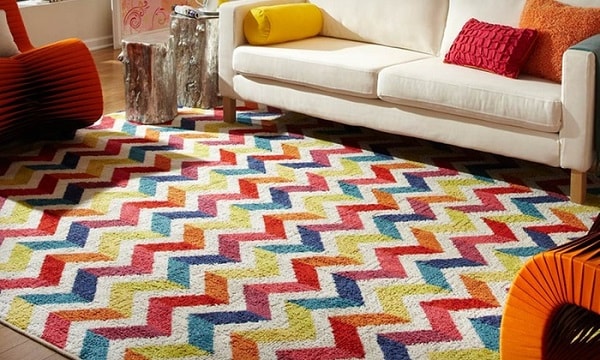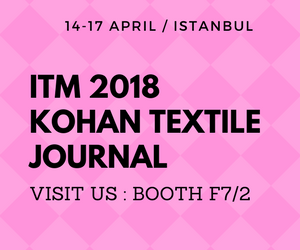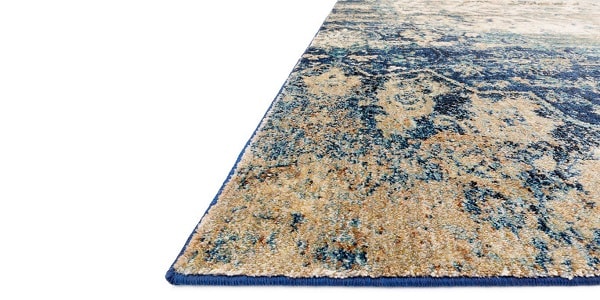Carpet Finishing Machinery
Interview with Mr. Roozbeh Moravej – Area Sales manager at Sellers
By: Behnam Ghasemi – Kohan Textile Journal
Carpet Finishing Machinery :: Mr. Roozbeh Moravej is the new face of the British company, Sellers Global Engineers, in Iran; we sat down with him for an interview to talk over issues such as the machine-made carpet industry and carpet finishing lines and the challenges that the industry faces for further advancement.
Mr Moravej advised that a great deal of importance should be attached to the carpet finishing process, hence the final quality of the carpet, and special attention must be paid to such machinery’s procurement, since the utilisation of a carpet finishing line and yielding the desired results out of it, is not a simple task. This is especially the case for export-orientated companies, who attach even more emphasis on carpet quality.

Kohan Textile Journal (KTJ): Mr Moravej, please provide a brief biography of yourself for the readers of Kohan Textile Journal.
Roobeh Moravej (RM): First of all thank you for the opportunity that your magazine has provided on this occasion.
I was born in Tehran, Iran in May 1977, and attended primary school in Tehran until 1986 when my family decided to emigrate to the United Arab Emirates. I attended the International School of Choueifat, a school set up by a group of Lebanese investors in Sharjah, UAE, and run by a British headmistress. I left the UAE in 1993 to continue my upper sixth education in a Jesuit School called Mount St Mary’s College in the North of England.
In September 1995, I started attending the University of Manchester to read Textiles.
After finishing my University education I started a trading company in Manchester which I maintain to date and subsequently returned to Iran in 2001 to join the family carpet production business, which included Carpet production, finishing and yarn spinning.
After many years in the production business, we eventually sold the businesses and I got involved in the machinery sales business. My activities in the machinery sales business, started out initially because of the long standing relationship that I have had and maintain with the owners and management of Sellers Engineers.

KTJ:How do you assess the current situation in the machine-made carpet industry, with a special view on existing carpet finishing machinery in Iran?
RM: As Many will know, the machine-made carpet industry in Iran, is mainly centered in the city of Kashan and surrounding areas such as Aran & Bidgol.
Of course there are a good number of long established companies scattered over some of the other cities of Iran who are almost all, our (Sellers’) customers.
Coming back to Kashan as the centre of machine made carpet weaving in Iran, there are a good number of commission carpet finishers active in this city – To explain further, these companies are active and specialise in the field of carpet finishing. Small to medium carpet weavers, send their “raw” or unfinished, woven carpets to these commission finishers, who finish the carpets and send them back to the weavers who in turn pack them and send them on to the final customer.
The situation which we have experienced in Iran in recent years, is such that, many of these commission finishers, have only had enough resources to purchase second hand machinery.
Carpet finishing is an extremely specialised and sensitive undertaking. To elaborate, even the purchasing of a Sellers machine and trying to “fit” it in with the rest of the finishing line without due care and attention may not yield the desired results – the whole line must be synchronised together ( without exaggerating) like a symphony orchestra.

One cannot always expect to purchase an independent machine on its own and achieve the same results by adding it to an existing line, as when compared to a synchronised line – bearing this in mind, and going back to what I said earlier about the resource constraints as well as the fact that political problems had caused severe limitations, some of the commission finishers purchased second-hand Sellers machinery, and did to a certain extent, succeed in “mixing and matching” with their existing lines.
What I intend to dwell on, here, is the emphasis on specialisation of carpet finishing machinery:
If you ask the opinion of three people who claim to be specialists in the field of carpet finishing, you will almost certainly get three different opinions on how to finish carpets in the best way possible.
What I have found over the years is that almost everybody in this trade has an opinion on how best to finish carpets, but there really exists a “best” way to finish carpets and if Sellers is approached to seek this professional opinion, we can certainly use our 106 year experience in carpet finishing machinery to provide the best way forward.
We believe that the carpet finishing line should be tailor made based on what type of carpets need to be finished.
One cannot expect to finish all sorts of carpets from low to high density and different raw materials and manufacturing methods such as Cut/loop, cut, shaggy… on the same line without at least making some adjustments and/or adding some machinery.

KTJ: What is the incentive for Carpet companies to have in-house (their own) carpet finishing line as opposed to sending their carpets to commission finishers for finishing?
RM: First of all, let me say that I see a bright future for the Iranian machine-made carpet industry; In terms of face to face carpet weaving, Iran ranks amongst the top 3 production centres in the world.
Furthermore, there are a good number of companies in Iran, that are shifting gear in terms of growth – that is to say they are growing from small/medium to large (from below 10 carpet looms to more than 20).
For reasons that I will outline here, most of these growing companies are likely to invest or perhaps upgrade their own carpet finishing line.
1) With an in house carpet finishing facility, companies are able to pay more detailed attention to finishing their own carpets.
2) In periods of high demand, like the run up to the new year, when there is pressure to get the carpets delivered faster, companies with in house finishing are able to prioritise their finishing and work flat out on their own carpet finishing, as opposed to shuffling various customer demands in the case of commission finishers.
Timely deliveries to retail / wholesale customers at times of peak demand, translates to more satisfied customers and usually more timely payments from them. In a period of time, when good cashflow is sometimes the difference between success and failure, an in house finishing facility can make all the difference!
3) With carpet weavers having to pay top dollar for good carpet designs, it is important to protect intellectual property investment.
While copyright law protects carpet weavers’ design and innovation investments to some extent, it does not entirely stop a plagiariser to pick up ideas and use them as her own.

When a new carpet design enters some commission finishers’ factory, it is at the mercy of being copied as there may be all sorts of prying eyes and “ready to click” cameras waiting to shoot away – having said that, even if the new carpet design does not go into a commission finisher’s factory, and is finished in house, it may still be purchased from a retailer and copied in that way; the difference is that the designs and innovations are protected for a longer period of time before arriving in the market, when they are finished in house, as well as the fact that buying the carpets to copy their designs, raises the plagiarist’s costs!
4) Another reason for the justification of having an in house finishing facility is huge savings on all the transport costs that have to be paid between the carpet weaver’s factory and that of the commission finisher’s.
Also, as the carpets are eventually packed in the carpet weaver’s factory, the carpets do not always have adequate protection from the elements such as rain and snow, while they are in transit between the commission finisher and the carpet weaver, thereby accepting the risk of soiled carpets and the disastrous results that follow!

At this point, for the avoidance of doubt and ambiguity, I would like to stress that there exist a number of commission finishing companies in Kashan and Aran & Bidgol that finish carpets to a very high standard and perhaps are globally unique in their own right, especially on finishing high-density carpets such as 1000 and 1200 reed carpets – these commission finishers are all known to me as well as being my friends and we enjoy a very good working relationship. It is noteworthy to say that all these companies either have entire Sellers finishing lines or at least a large proportion of their machinery consists of Sellers equipment.
I will further add that one of my family’s industrial activities since the 1980’s until not so long ago was this very activity of carpet finishing in the cities of Shiraz and Kashan and as far as I can remember, I grew up with the carpet industry.
Coming back to the subject of Carpet finishing, Sellers is committed to providing the right finishing line for the requirements and this is the reason that there is a detailed consultation process, when a potential client approaches us to buy equipment. This is why our experts will ask questions along the lines of, what type of carpet do you want to finish? what kind of raw materials will be used in your carpets? Acrylic, polyester, polypropylene…..?

KTJ: Up to what extent will finishing a carpet to a good standard affect the final quality of the carpet?
RM: Finishing is without doubt one of the most important factors in determining the final quality of the carpet.
firstly, in Sellers’ lines, the tension the carpet is under is always being measured by smart sensors to ensure that the carpet is under the right amount of tension.
The individual elements of a good finishing line do not work independent of each other, and if attention is not paid to this issue, the final result on the carpet can lead to a substandard product.
Excess tension can lead to problems that may not immediately show themselves and may develop over time – maybe even after the carpet has been purchased by the final consumer.
The next issue is beating and cleaning the face and back of the carpet. Sellers’ lines use vibratory beaters and special brushes to remove dust and fluff from carpets.
Vertical steamers are used in Sellers’ lines in a controlled system for the front and back of the carpet.
The steam ensures the “flourishing” of the pile yarn and makes the back ready to absorb the latex so as to ensure pile fixation. The flourishing of the pile yarn also ensures a more efficient and effective pile shearing process.
Perhaps one of the most important elements in a carpet finishing line is the oven, which is a closed system and the controlled flow of hot and cold air ensures the perfect finish. Temperature control is of paramount importance at this stage.
The steam cylinder is the next stage, which “irons” the back of the carpet. I have personally heard of cases where some adventurous individuals have built or ordered to be built, a steam cylinder which was not built to the specification it should have and subsequently led to tragic results with loss of life as a result of the cylinder exploding.

KTJ: Sellers is one the very well-recognised brands/ machinery manufacturers in the carpet finishing machinery industry. How is Sellers regarded in Iran?
RM: It may seem obvious for me to want to promote Sellers at every opportunity I receive and I do not hide this fact. I am a firm believer that one must wholeheartedly believe in the product before s/he attempts to sell it, and my credentials confirm this – My own family business was using Sellers equipment!
Furthermore, in our industry, there is nothing more important than word-of-mouth marketing; to say that Sellers is regarded as the “Rolls Royce” of carpet finishing machinery in Iran is not an exaggeration. Without doubt, Sellers is the undisputed market leader in Iran, and I openly challenge anyone to prove otherwise. This is true both for new as well as second-hand equipment.
The only reason why we were unable to sell new lines to Iran in recent years, were due to economic sanctions, otherwise, the demand did exist and I have personally seen documentation to this effect.
Even during the sanctions period, second-hand Sellers of carpet finishing machinery were being imported to Iran, showing interest for the brand.
The first machine-made carpet-producing factory in Iran was established in 1971 in the city of Kashan, going by the name of Kashan Carpet Industries and its carpet finishing line was bought from Sellers, thereby firmly establishing Sellers as the market leader in Iran to this day.
When a company in Iran decides to buy a carpet finishing line, they will almost certainly have Sellers as the top choice for consideration. If they have the financial resources they will buy a new Sellers line and if not, the choice is almost certainly a 2nd hand Sellers line as opposed to a new line from an alternative supplier – this is the strength of the Sellers brand in Iran!
KTJ: Mr Moravej, thank you for your time in granting us this interview.
RM: Thank you for giving me this opportunity.



















